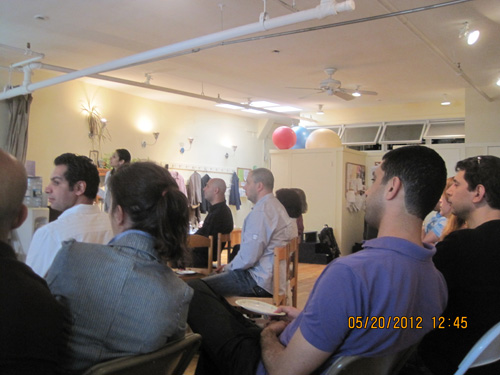TUNESS brought the distinguished speaker Dr. Lotfi Hermi for a mind opening analysis about democracies that include mathematical modeling with a deep journey in the supporting historical facts.
{youtube}OeGuQHXqkdQ{/youtube}
Description:
Election numbers have been used, and abused, by those who are currently in power in Tunisia, and by their political foes, for all sorts of propaganda, during and after the October 2011 elections. The purpose of this discussion is to present analysis of the Hare scheme, otherwise known as the method of largest remainder, used to divide seats among parties contesting Tunisia’s first democratic election, and gauge it against other well-known schemes used in the US, Switzerland, Italy, Denmark, and Sweden. Effective number of political parties, and various important political measures will also be presented. Three extremely famous inheritance rulings by Ali ibn Abi Talib (the Camel Division Ruling, the Minbar Problem, and the Dinari Problem), directly related to Tunisia’s electoral contest, form the basis of a historical argument for the adoption of this simple, yet extremely robust, local method representing political biases by the populace that could be adopted and replicated by many other Arab Spring states.
The propaganda games have not subsided, and will likely increase as a date for the next election cycle is announced, evidenced by the circulating joke that Marzouki is president with only 7,000 of the popular vote, while in reality, he is president with anywhere between 40% and 60% of the popular vote, if the National Assembly acted as an Electoral College, in accordance with US electoral rules. The talk will focus on numbers and their meanings, and also explain the mysterious number 217.
Biography:
Dr. Lotfi Hermi, alumnus of the Bardo Khaznadar Lyceum, left Tunisia in 1986 on a national merit scholarship to study Mechanical Engineering at the University of Missouri--Columbia, which he completed in 1990. He has an M.S. in Applied Mathematics from Ohio State University (1992) and a Ph.D. in Mathematics from University of Missouri--Columbia (1999). Dr. Hermi is Assistant Professor of Mathematics at the University of Arizona. His academic carrier includes visits to Marshall University, and the Georgia Institute of Technology.
His research interests center around various aspects of spectral analysis, specifically dealing with geometric and universal bounds of eigenvalues, spectral isoperimetric inequalities (the Dido Problem), semiclassical analysis, and their applications to pattern recognition. Together with Deb Hughes Hallett and Bill McCallum he developed materials exploring aspects of voting theory http://math.arizona.edu/~voting-theory, and has co-organized with them and M. Ben Rhouma the 2007 "Learning Technologies and Mathematics Middle East Conference'" which was held at Sultan Qaboos University, Muscat, Oman (http://math.arizona.edu/~atp-mena/conference/). He also co-organized the “International Conference on the Isoperimetric Problem of Queen Dido and its Mathematical Ramifications”, held in Carthage, May 2010 (http://math.arizona.edu/~dido/).

